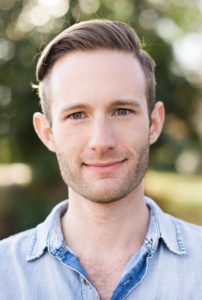I began college in the fall of 2006 as a pre-med honors student with an undeclared major, an ambivalent relationship to religion, and a less-than-positive attitude about the entire affair. I wanted to go somewhere big, prestigious and, most importantly, far away from home. Instead, I found myself moving to the small, regionally known, historically Baptist college just 30 minutes down the road from where I grew up. In an attempt to make the best of it, my plan was to get in, do what was necessary to get into a good medical school, and get out in as short a time as possible.
Unfortunately, I loathed the required pre-med classes, loved most of the rest of the liberal arts curriculum, and eventually decided to scrap the med school plans altogether after falling in love — as undergraduates are wont to do from time to time. And like so many great love stories, I can tell you exactly when and where this particular affair began.

Isaac Sharp
During the spring semester of my freshman year at Carson-Newman College (now University), in a classroom on the second floor of Henderson Humanities building, in an honors New Testament course taught by Ross Brummett, I first fell in love with the academic study of theology and set out on a career path that led me to where I am today. After declaring my major as religion, I then spent the next three years under the watchful care and gentle pastoral guidance of Ross Brummett, Don Garner and the rest of the Carson-Newman religion and philosophy faculty, slowly reclaiming a connection to the Christian faith that was tenuous at best when I first enrolled.
By the time I graduated in 2010, in other words, I had become the exact inverse of the usual college trope. Due almost exclusively to the influence of my religion professors, I ended college more seriously Christian than when I began. In fact, I became so serious about investigating what it means to be a person of faith in the world that I spent the better part of the next decade studying religion and theology, graduating with a Ph.D. in Christian social ethics in May 2019.
For all of these reasons and more, I was devastated to learn that the institution that helped shape me has recently begun making a number of personnel changes and policy decisions with the potential to profoundly alter the welcoming religious culture that made me what I am today.
As a student of Baptist history — one of my minors at Carson-Newman — I am intimately aware of the denominational negotiations and doctrinal pressures that come along with the school’s Southern Baptist heritage. As a newly minted Ph.D. scouring an increasingly bleak academic job market, I also have first-hand knowledge of the persistent financial difficulties facing all small colleges. And as a social ethicist, I furthermore recognize that institutional evolution and theological change are often inevitable and regularly painful.
“Due almost exclusively to the influence of my religion professors, I ended college more seriously Christian than when I began.”
But a number of recent and dramatic firings, hirings and retirements makes it impossible to ignore my suspicion that crucial decisions about the direction of the school are being made for largely or even purely political reasons. And as a proud alumnus, I fear that such decisions are the harbinger of an increasingly authoritarian religious culture that will irrevocably undermine the school’s ability to provide the kind of winsome pastoral guidance that kept me and others like me from leaving the Christian fold altogether.
If, for instance, I had spent my college years worried about passing a strict denominational litmus test, dreamt up by a faceless group of universally old, white and male Southern Baptist pastors, I not only would have left the school, I likely would have left the faith. Thankfully, during my late adolescent wrestling with belief, I was given grace instead — which, after all, is among the most irreducibly Christian theological concepts — and, at least for me, the fact that the religion faculty gave me the grace to ask questions, debate and explore made all the difference.
Anyone paying attention knows that American Christianity is in the midst of a generational crisis. Convinced that Christians are irredeemably racist, sexist, xenophobic, homophobic and so selfishly and slavishly devoted to a contemporary political platform that they seem to have given up even attempting to look like Jesus, Millennials and their younger Gen-Z siblings are leaving the church in droves. I know because I have almost joined them several times.
This generational crisis presents Christian colleges, broadly speaking, with two major alternatives.
Option 1 will be to become homogenous indoctrination academies where dissenters and most if not all non-Christians either are eventually expelled for failing to meet an increasingly long and maddeningly specific list of doctrinal requirements or are explicitly unwelcome in the first place.
This path will reinforce an entire generation’s association of Christianity with intolerance. From a purely pragmatic standpoint, in the long run, it may also ultimately spell institutional demise as the supply of students interested in a place like that is drying up quickly already and the hemorrhaging shows no signs of slowing down.
With their recent decision to revoke the admission of a graduate student simply because he is gay, Union University, Carson-Newman’s West Tennessee counterpart, has quite clearly chosen this path.
“A school more interested in toeing the party line than in fully embracing the opportunity to welcome whosever might come is not a place I want to be associated with any longer.”
Option 2 will be to throw wide the doors of the Christian college community to all who might benefit from the unique blend of intellectual formation and spiritual growth and development offered therein. Professors will serve neither as catechists nor as doctrinal police and will instead invite a spiritually open but theologically unsure generation to taste and see the good that exists in the broad stream of the historic Christian tradition.
But most of all they will teach their subjects to the best of their abilities in an environment where the unconverted are as welcome to learn as the converted, thereby subverting some of the worst of white Christianity’s increasingly negative reputation. (On a related note: they will also commit themselves to the difficult but indispensable work of casting aside the white supremacist assumptions of a cultural Christianity long distorted by the accretions of whiteness, but that is a column for another day.)
Although I always have hoped that this is what Carson-Newman could do and be, I increasingly fear that my alma mater is heading down a path far closer to the former than the latter. And although I harbor no illusions about this column’s potential to change the minds of the powers that be, I would be derelict in my duty as a proud alum if I did not make one thing abundantly clear: a school more interested in toeing the party line than in fully embracing the opportunity to welcome whosever might come is not a place I want to be associated with any longer. If Carson-Newman is indeed becoming that kind of place, I will have no further reason to step foot on its campus ever again, and I will make it abundantly clear to anyone I encounter that they should not either.
Isaac B. Sharp is director of certificate programming and visiting professor at Union Theological Seminary in the City of New York. He is the co-editor, with David P. Gushee, of Evangelical Ethics: A Reader and the forthcoming Christian Ethics in Conversation.


